非谓语三种形式的区别和辨析
非谓语动词讲义
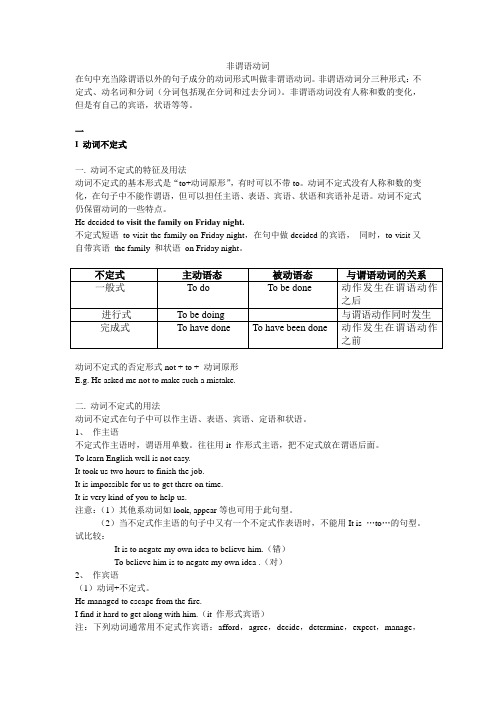
非谓语动词在句中充当除谓语以外的句子成分的动词形式叫做非谓语动词。
非谓语动词分三种形式:不定式、动名词和分词(分词包括现在分词和过去分词)。
非谓语动词没有人称和数的变化,但是有自己的宾语,状语等等。
一I 动词不定式一. 动词不定式的特征及用法动词不定式的基本形式是“to+动词原形”,有时可以不带to。
动词不定式没有人称和数的变化,在句子中不能作谓语,但可以担任主语、表语、宾语、状语和宾语补足语。
动词不定式仍保留动词的一些特点。
He decided to visit the family on Friday night.不定式短语to visit the family on Friday night,在句中做decided的宾语,同时,to visit又自带宾语the family 和状语on Friday night。
动词不定式的否定形式not + to + 动词原形E.g. He asked me not to make such a mistake.二. 动词不定式的用法动词不定式在句子中可以作主语、表语、宾语、定语和状语。
1、作主语不定式作主语时,谓语用单数。
往往用it 作形式主语,把不定式放在谓语后面。
To learn English well is not easy.It took us two hours to finish the job.It is impossible for us to get there on time.It is very kind of you to help us.注意:(1)其他系动词如look, appear等也可用于此句型。
(2)当不定式作主语的句子中又有一个不定式作表语时,不能用It is …to…的句型。
试比较:It is to negate my own idea to believe him.(错)To believe him is to negate my own idea .(对)2、作宾语(1)动词+不定式。
英语非谓语动词考点3篇
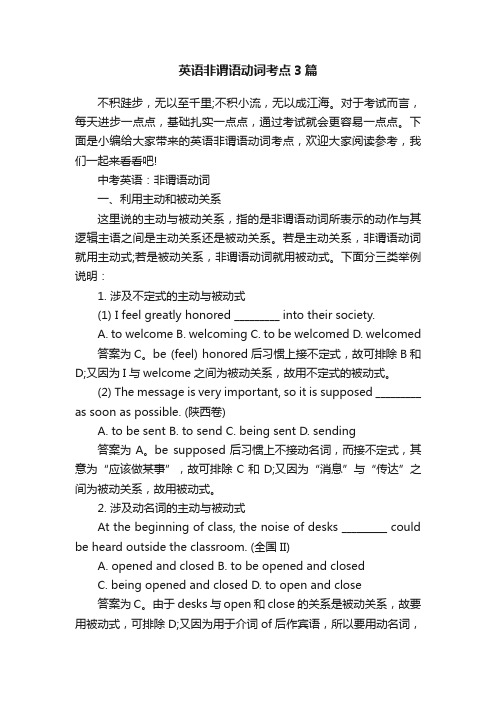
英语非谓语动词考点3篇不积跬步,无以至千里;不积小流,无以成江海。
对于考试而言,每天进步一点点,基础扎实一点点,通过考试就会更容易一点点。
下面是小编给大家带来的英语非谓语动词考点,欢迎大家阅读参考,我们一起来看看吧!中考英语:非谓语动词一、利用主动和被动关系这里说的主动与被动关系,指的是非谓语动词所表示的动作与其逻辑主语之间是主动关系还是被动关系。
若是主动关系,非谓语动词就用主动式;若是被动关系,非谓语动词就用被动式。
下面分三类举例说明:1. 涉及不定式的主动与被动式(1) I feel greatly honored _________ into their society.A. to welcomeB. welcomingC. to be welcomedD. welcomed答案为C。
be (feel) honored后习惯上接不定式,故可排除B和D;又因为I与welcome之间为被动关系,故用不定式的被动式。
(2) The message is very important, so it is supposed _________ as soon as possible. (陕西卷)A. to be sentB. to sendC. being sentD. sending答案为A。
be supposed后习惯上不接动名词,而接不定式,其意为“应该做某事”,故可排除C和D;又因为“消息”与“传达”之间为被动关系,故用被动式。
2. 涉及动名词的主动与被动式At the beginning of class, the noise of desks _________ could be heard outside the classroom. (全国II)A. opened and closedB. to be opened and closedC. being opened and closedD. to open and close答案为C。
非谓语动词
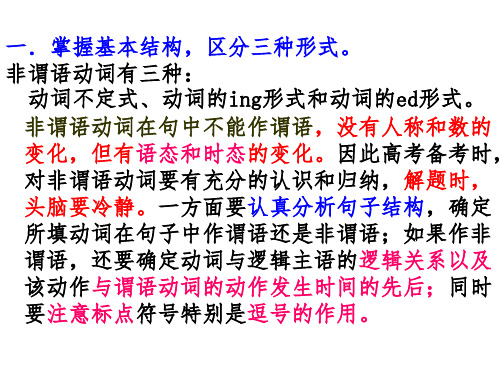
分析语态就是在确定逻辑主语之后,分析非 谓语动词和逻辑主语在搭配使用时是主动还 是被动关系。
seen 1.______from space , the earth ooks blue . 2.______from space , we can see the earth is blue seeing
看句子是否有连词,最后确定是否选非谓语
A 3. ______to the left , you'll find the post office . C 4. If you _____to the left , you'll find the post office . C 5. ______to the left , and you'll find the post office .
A. Turning B. To turn C. Turn D. Turned
确定要选非谓语动词之后,第二步要分析其 逻辑主语。非谓语动词虽不能作谓语, 但仍具有动词特点,其逻辑上的动作执行者 就叫做逻辑主语。非谓语动词作状语时 ,其逻辑主语须和句子的真正主语一致。若 不一致,则须加上自己的逻辑主语。 First ____ to the market, these products enjoyed great success.
1.The building ______now will be a restaurant . 2. The building ______next year will be a restaurant . 3. The building ______last year is a restaurant. (build) 1. being built 2. to be built 3. built
高中语法解析非谓语动词的完成与进行形式辨析
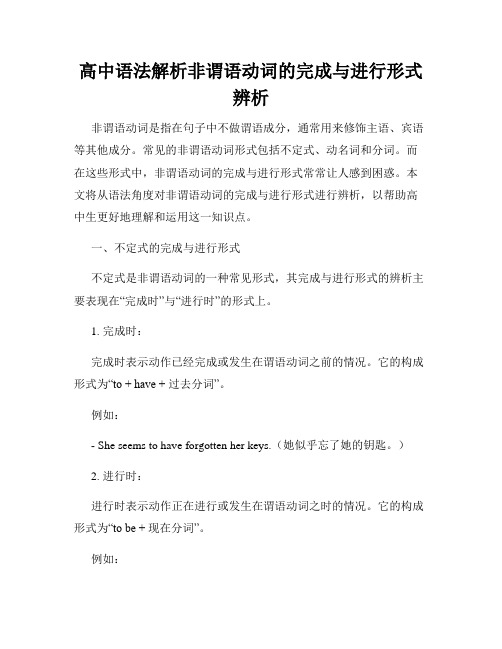
高中语法解析非谓语动词的完成与进行形式辨析非谓语动词是指在句子中不做谓语成分,通常用来修饰主语、宾语等其他成分。
常见的非谓语动词形式包括不定式、动名词和分词。
而在这些形式中,非谓语动词的完成与进行形式常常让人感到困惑。
本文将从语法角度对非谓语动词的完成与进行形式进行辨析,以帮助高中生更好地理解和运用这一知识点。
一、不定式的完成与进行形式不定式是非谓语动词的一种常见形式,其完成与进行形式的辨析主要表现在“完成时”与“进行时”的形式上。
1. 完成时:完成时表示动作已经完成或发生在谓语动词之前的情况。
它的构成形式为“to + have + 过去分词”。
例如:- She seems to have forgotten her keys.(她似乎忘了她的钥匙。
)2. 进行时:进行时表示动作正在进行或发生在谓语动词之时的情况。
它的构成形式为“to be + 现在分词”。
例如:- He pretended to be working when his boss entered the office.(当他的老板走进办公室时,他假装正在工作。
)二、动名词的完成与进行形式动名词是非谓语动词的另一种常见形式,其完成与进行形式的辨析主要在于完成时的构成形式。
1. 完成时:完成时表示动作已经完成或发生在谓语动词之前的情况。
它的结构为“现在分词 + having + 过去分词”。
例如:- Having finished her homework, she went to bed.(她做完功课后上床睡觉了。
)2. 进行时:进行时表示动作正在进行或发生在谓语动词之时的情况。
它的构成形式为“现在分词+ being”。
例如:- He saw her running towards the bus stop.(他看见她朝着公交车站跑去。
)三、分词的完成与进行形式分词作为非谓语动词的一种形式,在完成与进行形式的辨析上也存在一些规律。
初中英语语法专题七 非谓语动词

2.不定式的句法作用 动词不定式具有名词、形容词和副词的作用,它 可以作主语、表语、宾语、宾语补足语、定语和状语 等。 (1)作主语 动词不定式作主语时,常用it作形式主语,而将 真正的主语放在句末,It+be+形容词+(for sb.)+动 词不定式。
It's important (for us) to protect the environment. (对我们来说)保护环境是很重要的。 注:当在 kind,good,nice,clever 等表示人的品 质的形容词后,不用 for 而用 of。 It's very kind of you to help me.你帮助我真是太好 啦。
Please try to do better next time. 请下次设法做得更 好些。 He tried speak ing English to us. 他试着用英语和我 们谈话。
Go on to do the other exercise after you finish this one. 做完这个练习题后,接着做另一个练习题。 Go on doing the exercise after a short rest. 休息一会儿之后继续做练习。
其后既可以接动词 -ing形式,也可接动词不定 式 的动词及动词词组 有love, like, prefe r, be gin, s tart, continue, remembe r,try, s top, forget, hate,need,allow,go on等。
介词后接动词-ing形式的动词短语有 keep...from,stop...from,make a contribution to, look forward to,spend...(in),be afraid of,be proud of,be used for,feel like,give up,be interested in,put off等。
动词的非谓语形式

动词的非谓语形式:动词不做谓语时的固定形式。
(1) 动词的非谓语形式包括动词不定式、动名词和分词三种形式;其中分词又包含现在分词和过去分词两种形式。
它们在句子中不能单独作谓语。
(2) 动词不定式:①形式:动词不定式基本形式由“不定式记号to+动词原形”构成。
它的否认形式只要在“to” 前面加上“not”。
它的疑问形式是:“wh-疑问词+to+动词原形”。
*它的被动形式:“to be +过去分词”。
*它的完成形式:“to have +过去分词”。
②动词不定式具有名词、形容词和副词的特征,即可以在句子中作主语、宾语、定语、状语、表语和宾语补足语。
但不定式也保留动词的某些特征,即不定式后面可以跟宾语、表语和状语。
动词不定式加上相关成分就构成不定式短语。
③动词不定式可以放在谓语前句子作主语。
但是通常将作主语的动词不定式或不定式短语放在谓语后面,而在主语位置用“it”作形式主语(有时在不定式的前面还会用for sb.表示不定式的逻辑主语)。
如:To help animals is helping people.(帮助动物就是帮助人)/ It is very difficult (for us) to learn Chinese well.((对于我们而言)学好汉语是非常的困难)/ It took me half an hour to work out this problem.(解出这道题花了我一个小时的时间)④动词不定式可以作谓语动词(及物动词)的宾语。
[A] 及物动词+不定式一般形式:如:I would like to have a rest at the moment.(我现在想休息一下)/ They began to search the room for the thief.(他们开始在屋子里搜寻小偷)/ He liked to have aswim in the pool near his house.(他喜爱在靠家的水塘里面游泳)/ When did you learn to speak English?(你什么时候开始学英语的?)/ Don’t forget to close the door when you leave.(你离开时别忘了关门)[比较] He forgot to turn off the light.(他忘了关灯.) (没关)/ He forgot turning off the light.(他忘记关过灯.)(关了) / Please remember to ring me up.(记得给我打.)(还没打) / I remember calling you yesterday but you forgot.(我记得昨天给你打了,但是你忘记了.)(打过)[B] 及物动词+疑问词+不定式:如:He does not know which one to take.(他不知道该选哪个)/ Tell me how to get to the station.(告诉我怎么样去火车站)/ She asked me what to do for today’s homework.(她问我今天家庭作业做什么)/ Can you teach me how to search the internet?(你能教我怎样上网吗?)[C] 不定式作宾语而后面又有宾语补足语时,通常用it代替作形式宾语,而不定式则后置。
小升初复习非谓语动词的辨析与用法

小升初复习非谓语动词的辨析与用法非谓语动词,指在句子中作动词、形容词或副词用的动词形式,不受主语的人称和数的变化,也不用于句子的谓语。
在学习英语的过程中,准确使用非谓语动词是非常重要的。
本文将对小升初阶段常见的非谓语动词用法进行辨析和总结。
一、不定式(Infinitive)不定式可分为“带to不定式”和“不带to不定式”。
1.带to不定式带to的不定式常用在动词后作宾语、表语或定语,表示目的、结果、考虑、意愿等。
例句:- I want to learn English.(我想学英语。
)- The book is easy to understand.(这本书很容易理解。
)- He is old enough to drive.(他已经足够大可以开车。
)2.不带to不定式不带to的不定式多用于感官动词(see, hear, feel等)后作宾语,也可用于情态动词(can, must, should等)后作宾语。
例句:- I heard him sing a song.(我听到他唱歌。
)- You must finish your homework.(你必须完成作业。
)二、动名词(Gerund)动名词通常由动词的ing形式构成,可作主语、宾语、表语、定语和状语。
1.作主语动名词作主语时,谓语动词常用单数形式。
例句:- Swimming is good for your health.(游泳对健康有益。
)- Reading books is my hobby.(读书是我的爱好。
)2.作宾语常见的动词后接动名词作宾语,如enjoy, mind, recommend等。
有些动词后接动名词与带to不定式的区别是意思上的差异。
例句:- I enjoy playing chess.(我喜欢下棋。
)- He likes to play basketball.(他喜欢打篮球。
)3.作表语动名词常用来作为be动词的表语,表示特殊的状态或行为。
高中英语语法 ―― 非谓语动词讲解
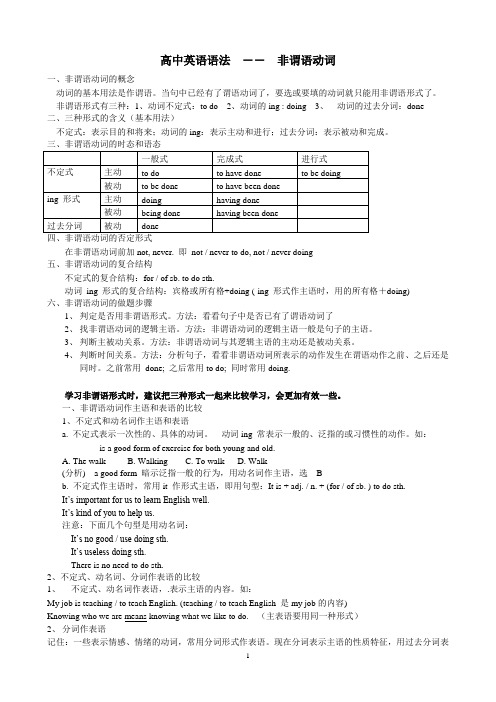
高中英语语法――非谓语动词一、非谓语动词的概念动词的基本用法是作谓语。
当句中已经有了谓语动词了,要选或要填的动词就只能用非谓语形式了。
非谓语形式有三种:1、动词不定式:to do 2、动词的ing : doing 3、动词的过去分词:done二、三种形式的含义(基本用法)不定式:表示目的和将来;动词的ing:表示主动和进行;过去分词:表示被动和完成。
在非谓语动词前加not, never. 即not / never to do, not / never doing五、非谓语动词的复合结构不定式的复合结构:for / of sb. to do sth.动词ing 形式的复合结构:宾格或所有格+doing (-ing 形式作主语时,用的所有格+doing)六、非谓语动词的做题步骤1、判定是否用非谓语形式。
方法:看看句子中是否已有了谓语动词了2、找非谓语动词的逻辑主语。
方法:非谓语动词的逻辑主语一般是句子的主语。
3、判断主被动关系。
方法:非谓语动词与其逻辑主语的主动还是被动关系。
4、判断时间关系。
方法:分析句子,看看非谓语动词所表示的动作发生在谓语动作之前、之后还是同时。
之前常用done; 之后常用to do; 同时常用doing.学习非谓语形式时,建议把三种形式一起来比较学习,会更加有效一些。
一、非谓语动词作主语和表语的比较1、不定式和动名词作主语和表语a. 不定式表示一次性的、具体的动词。
动词ing 常表示一般的、泛指的或习惯性的动作。
如:________ is a good form of exercise for both young and old.A. The walkB. WalkingC. To walkD. Walk(分析) a good form 暗示泛指一般的行为,用动名词作主语,选 Bb. 不定式作主语时,常用it 作形式主语,即用句型:It is + adj. / n. + (for / of sb. ) to do sth.It’s important for us to learn English well.It’s kind of you to help us.注意:下面几个句型是用动名词:It’s no good / use doing sth.It’s useless doing sth.There is no need to do sth.2、不定式、动名词、分词作表语的比较1、不定式、动名词作表语,.表示主语的内容。
高中英语知识点归纳非谓语动词和谓语动词的区别
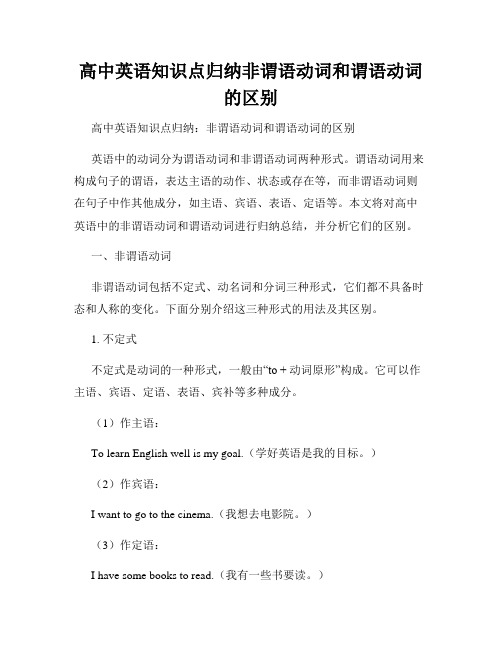
高中英语知识点归纳非谓语动词和谓语动词的区别高中英语知识点归纳:非谓语动词和谓语动词的区别英语中的动词分为谓语动词和非谓语动词两种形式。
谓语动词用来构成句子的谓语,表达主语的动作、状态或存在等,而非谓语动词则在句子中作其他成分,如主语、宾语、表语、定语等。
本文将对高中英语中的非谓语动词和谓语动词进行归纳总结,并分析它们的区别。
一、非谓语动词非谓语动词包括不定式、动名词和分词三种形式,它们都不具备时态和人称的变化。
下面分别介绍这三种形式的用法及其区别。
1. 不定式不定式是动词的一种形式,一般由“to + 动词原形”构成。
它可以作主语、宾语、定语、表语、宾补等多种成分。
(1)作主语:To learn English well is my goal.(学好英语是我的目标。
)(2)作宾语:I want to go to the cinema.(我想去电影院。
)(3)作定语:I have some books to read.(我有一些书要读。
)(4)作表语:Her dream is to become a teacher.(她的梦想是成为一名教师。
)(5)作宾补:I find it difficult to understand this passage.(我发现理解这篇文章很困难。
)2. 动名词动名词常由动词加-ing形式构成,可以作主语、宾语、定语、表语等。
(1)作主语:Swimming is good exercise.(游泳是很好的锻炼。
)(2)作宾语:I enjoy playing basketball.(我喜欢打篮球。
)(3)作定语:The running water sounds soothing.(流水的声音听起来很舒缓。
)(4)作表语:Her hobby is painting.(她的爱好是绘画。
)3. 分词分词有现在分词和过去分词两种形式,可以作定语、表语和状语等。
(1)现在分词作定语:The crying baby needs attention.(哭泣的婴儿需要关注。
非谓语辨析

•
• 3.做宾语:不定式和动名词都可充当。 • I like swimming, but I don‘t like to swim today because I don’t feel well. (1).有些动词只能接不定式做宾语,这些 动词接上不定式,含有明显的主观性和将 来性意义。如:
•
(3).有些动词后面既可接不定式,又可接 动名词,其意义基本相同,区别不大。如; like,love,hate,continue,prefer, begin, start.
I prefer staying (to stay) at home on Sunday.
•
(4).有些词后面既可以接不定式.亦可接动 名词,但其意义有很大区别,须特别注意: 1.Please remember to bring me the book I want next time. • 2.I remember seeing her (=having seen her) somewhere before.
• The Smiths have gone to London to spend their holidays. • I came here (in order/so as) to hear the report.
•
• 1.The matter needs thinking over.(=to be thought over) • 2.A Mr. Wang wants to see you. • 3.You don't need to leave so early
非谓语三种形式的区别和辨析

非谓语动词三种形式用法的区别:1. 做主语:v-ing & to do 都可以做主语,大多数情况两者没有区别。
注意:但是v-ed不可以做主语。
Exploring the Amazon River deserves courage. ( doing 表抽象的概念)To explore the Amazon River deserves courage. ( to do 表具体的/将来的动作)其余注意事项:1)Seeing is believing.To see is to believe. (即:主语与表语的形式要一致)但是不能说:Seeing is to believe; 或者To see is believing.2)Lincoln said it was not right for the south to break away from the union.Linda said it was nice of you to lend her money.The children’s loving nature can surely inspire their love for their family members.3) It is no good / no use / useless + doing sth 句型It’s no use crying over spilt milk.4) There is no + doing. 句型There is no knowing what will happen next. 谁也不知道下一步会发生什么。
There is no telling what will happen. 谁也无法判断、辨别将要发生什么。
2. 做表语:My favorite hobby is to collect / collecting old coins. (一般概念to do/doing 可以互换)Our aim is to help the old lead a happy life. (表具体的/将来的动作用to do)We were all greatly amazed at the children’s wonderful performance.The children’s wonderful performance was amazing.3. 作宾语:用哪种形式做宾语往往跟动词的搭配用法有关like / love to do & like / love doing;begin / start to do & begin / start doing;prefer to do & prefer doing;continue to do & continue doing;try to do VS try doing;mean to do VS mean doing;can’t help doing VS can’t help (to) dogo on to do VS go on doing;stop to do VS stop doing;forget to do VS forget doing / forget having doneregret to do VS regret doing / regret having done;remember to do VS remember doing / remember having done;sth need doing & sth need to be done (需要)sth require doing & sth require to be done (需要)sth want doing & sth want to be done (需要)sth deserve doing & sth deserve to be done (值得)需要注意的重要形式:特殊疑问词(how / what / when/ where…) + to do = 宾语从句Hearing the sad news, I didn’t know what to do.= Hearing the sad news, I didn’t know what I could do.I couldn’t decide whether to work another year or change my job.= I couldn’t decide whether I could work another year or change my job.2)it 做形式宾语,to do / doing做真正的宾语I though it an honor to have been invited to dinner. ( to be invited to dinner的完成式) I found it no use attempting to lose weight by going on diet.3)I’m looking forward to seeing you again.I have no choice but to stay home for another hour.I have nothing to do but stay home for another hour.I can do nothing but stay home for another hour.4. 作宾语补足语:(考试重点)I often notice a little boy pass this corridor and enter the garden.I found a stranger walking nearby our shop.( doing 强调动作正在进行;(看到、注意到)动作的一部分)( to do强调动作已经完成;(看到、注意到)动作的全过程请注意下列句子的区别:We heard her singing next door. (听到她唱歌动作的一部分;听到她正在唱歌) (主动正在进行)We heard her sing next door. (听到她唱歌动作的全部分;听到她唱过歌) (主动完成)We heard the song sung by her. (听到这首歌被她唱过) (被动完成)We heard the song being sung by her next door. (听到她这首歌正在被她唱)(被动正在进行)Don’t have the water running all the day. (让…一直做) (主动,一直进行)The teacher had him read the text three times. (让...做…)(主动,做具体一件事情)I had my hair colored last Friday. (让…由别人做;遭遇到不好的事情)(被动,有别人完成)注意跟I have a lot of homework to do today. (有) 的区别。
非谓语动词、情态动词、虚拟语气辨析

非谓语动词辨析非谓语动词主要包括不定式、动名词和现在分词。
为了区分这三种不同的非谓语动词的用法和含义,我们将分别从三种非谓语动词在句子中做主语、宾语、宾语补足语、定语、状语、表语以及一些特殊结构句型等角度来区分其用法和细微含义。
1.不定式和动名词作主语的区别(1)动名词作主语通常表示抽象动作;而不定式作主语表示具体动作。
Smoking is prohibited(禁止)here.这里禁止抽烟。
(抽象)It is not very good for you to smoke so much.你抽这么多烟对你身体很不好。
(具体)(2)不定式做主语,一般用it当形式主语,把作主语的不定式短语后置。
It took me only five minutes to finish the job.2.不定式、动名词和分词作表语的区别(1)不定式作表语1)不定式作表语一般表示具体动作,特别是表示将来的动作。
To do two things at a time is to do neither.--次做两件事等于未做。
(2)动名词作表语:动名词作表语,表示抽象的一般性的行为。
Our work is serving the people.我们的工作是为人民服务。
His hobby is collecting stamps.他的爱好是集邮。
(3)分词作表语分词做表语有两种情况,一种是现在分词做表语,一种是过去分词做表语,这两者区别是考试中经常考到的地方。
一般来说,表示心理状态的动词如excite,interest等都是及物动词,汉语意思不是“激动”,“高兴”,而是“使激动”、“使高兴”,因而现在分词应该是“令人激动的”、“令人高兴的”,过去分词则是“感到激动的”和“感到高兴的”。
所以,凡表示“令人……的”都是-ing形式,凡是表示“感到……”都用-ed形式。
换句话说,若人对……感兴趣,就是somebody is interested in...,若人/物本身有兴趣时,就是说sb./sth. is interesting.这类词常见的有:interesting使人感到高兴--interested感到高兴的exciting令人激动的--excited感到激动的delighting令人高兴的--delighted感到高兴的disappointing令人失望的--disappointed感到失望的encouraging令人鼓舞的--encouraged感到鼓舞的pleasing令人愉快的--pleased感到愉快的puzzling令人费解的--puzzled感到费解的satisfying令人满意的---satisfied感到满意的surprising令人惊异的--surprised感到惊异的worrying令人担心的--worried感到担心的Travelling is interesting but tiring.旅行是有趣的,但是使人疲劳。
非谓语动词讲解

一、非谓语动词定义Key concept: 非谓语动词是指在句子中不是谓语的动词,主要包括不定式 to do 、动名词和过去分词,即动词的非谓语形式,通常可以再句子中担任除谓语以外的其他成分,而且不受主语的人称和数的限制。
二、动词-ing 形式、过去分词和不定式的用法区别非谓语动词的语法功能所能充当的成分主语表语宾语宾语补足语定语状语V-ing 形式现在分词△△△△动名词△ △ △ △不定式(to do ) △ △ △ △ △△ 过去分词(done)△△△ △1. 不定式to do, 动词-ing 和过去分词三者辨析:Eg. 1) The film is disappointing.2) We are disappointed with the film. 3) Our aim is to enter the universities.批注:以上三个例句中,例1动词-ing 形式作表语,表示主语the film 的性质和特点,表语和主语的位置不可以互换;例2过去分词作表语,表示主语we所处的状态,表语和主语的位置不可以互换;高中英语非谓语动词用法辨析详解作表语例3不定式作表语,表示主语的内容“我们的目标是什么”。
表语和主语的位置可以互换。
总结:非谓语动词作表语时的区别动词-ing形式作表语时,主要表示主语的具体内容,或主语的性质、特点。
多数情况下,主语和表语的位置不可以互换。
过去分词-ed 作表语时,主要表示主语所处的状态。
主语和表语的位置不可以互换。
动词不定式to do 表示主语的具体内容。
主语和表语的位置可以互换。
Eg. 1) Please go to the sleeping car.2) Look, the falling leaves are all yellow. Lots of fallen leaves make the road yellow.看,这些落叶(正在下落)全是黄色的。
词法:非谓语动词用法区别

词法:非谓语动词用法区别非谓语动词共有三种形式:不定式、动词的-ing形式和动词的-ed形式。
现以动词make为例,将非谓语动词的三种形式及其功能总结如下。
(1)非谓语动词的不定式①主动语态②被动语态③句法功能:在句中可做主、宾、表、定、状A.一般式to make A.一般式to be made 补语。
B.进行时to be making B.完成式to have been madeC.完成式to have made(2)非谓语动词的-ing形式①主动语态②被动语态③句法功能:在句中可做主、宾、表、定、状A.一般式making A.一般式:being made 补语。
B.完成式having made B.完成式:having been made(3)非谓语动词的-ed形式①被动语态A.一般式madeB.完成式made②句法功能:在句中可做表、定、状、补语。
由以上可以看出,非谓语动词的各种形式在意义上有相交叉的区域,因此认真区分它们的用法对于准确理解和表达英语是很有帮助的。
如to be done , being done , done , having been done 都可表示被动,同时都可作定语,但它们在作定语时是有明显区别的。
The school to be built is intended for the disabled children .即将要建的学校是为了残疾儿童而设的。
The school being built is intended for the disabled children .正在建设的学校是为残疾儿童而设的。
The school built last year is intended for the disabled children .去年建的学校是为残疾儿童而设的。
The school , having been built for two years , is intended for the disabled children .花了两年多建设的学校是为残疾儿童而设的。
非谓语动词之动名词和不定式的辨析
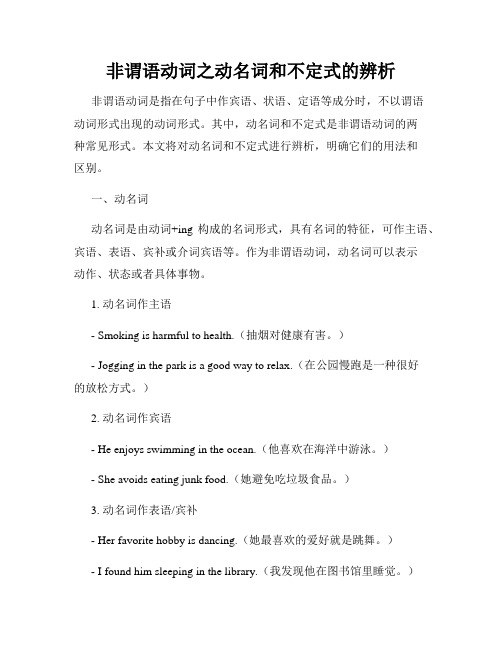
非谓语动词之动名词和不定式的辨析非谓语动词是指在句子中作宾语、状语、定语等成分时,不以谓语动词形式出现的动词形式。
其中,动名词和不定式是非谓语动词的两种常见形式。
本文将对动名词和不定式进行辨析,明确它们的用法和区别。
一、动名词动名词是由动词+ing构成的名词形式,具有名词的特征,可作主语、宾语、表语、宾补或介词宾语等。
作为非谓语动词,动名词可以表示动作、状态或者具体事物。
1. 动名词作主语- Smoking is harmful to health.(抽烟对健康有害。
)- Jogging in the park is a good way to relax.(在公园慢跑是一种很好的放松方式。
)2. 动名词作宾语- He enjoys swimming in the ocean.(他喜欢在海洋中游泳。
)- She avoids eating junk food.(她避免吃垃圾食品。
)3. 动名词作表语/宾补- Her favorite hobby is dancing.(她最喜欢的爱好就是跳舞。
)- I found him sleeping in the library.(我发现他在图书馆里睡觉。
)4. 动名词作介词宾语- He is tired of waiting for the bus.(他厌倦了等公交车。
)- She is good at playing the piano.(她擅长弹钢琴。
)二、不定式不定式是由"to + 动词原形"构成的形式,具有动词和名词的特征,可作主语、宾语、表语、宾补和定语等。
作为非谓语动词,不定式可以表示目的、原因、结果和程度等。
1. 不定式作主语- To learn a new language requires patience and persistence.(学习一门新语言需要耐心和坚持。
)- To succeed in life is everyone's ultimate goal.(在生活中取得成功是每个人的终极目标。
高中英语 非谓语动词专题(共20张PPT)

非谓语动词常考点 1. 非谓语动词作定语 2.非谓语动词做状语 3.非谓语动词做宾补 4. with 的复合结构
The teacher sitting there are from other school. Swimming in summer, we can get cool. I want him to see you.
谓语与非谓语的比较练习: 1.He entered the room,____(hold) a book in his hand. 2.He entered the room, and ____(hold) a book in his hand. 3.I politely refused her invitation and ___(walk) away. 4.I politely refused her invitation , ___(walk) away. 5.A boy ___(call) Jack came here today. 6.A boy who ___(call) Jack came here today. 7.We enjoy the movie____(direct) by a famous artist. 8.We enjoy the movie which____(direct) by a famous artist. 9.When I ___(hear) the news, I was excited . 10.When ___(hear) the news, I was excited . 11. Unless I ____(invite),I won’t attend the party. 12. Unless ____(invite),I won’t attend the party.
学案:非谓语动词对比讲解
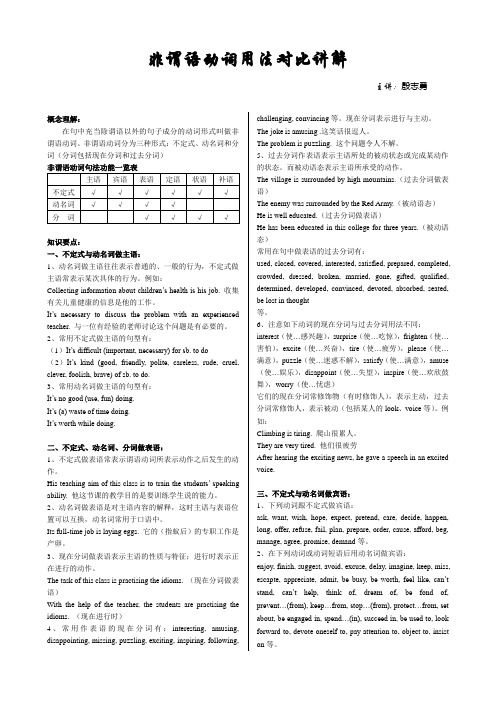
非谓语动词用法对比讲解主讲:殷志勇概念理解:在句中充当除谓语以外的句子成分的动词形式叫做非谓语动词。
非谓语动词分为三种形式:不定式、动名词和分词(分词包括现在分词和过去分词)知识要点:一、不定式与动名词做主语:1、动名词做主语往往表示普通的、一般的行为,不定式做主语常表示某次具体的行为。
例如:Collecting informa tion about children’s health is his job. 收集有关儿童健康的信息是他的工作。
It’s necessary to discuss the problem with an experienced teacher. 与一位有经验的老师讨论这个问题是有必要的。
2、常用不定式做主语的句型有:(1)It’s difficult (important, necessary) for sb. to do(2)It’s kind (good, friendly, polite,careless, rude, cruel, clever, foolish, brave) of sb. to do.3、常用动名词做主语的句型有:It’s no good (use, fun) doing.It’s (a) waste of time doing.It’s worth while doing.二、不定式、动名词、分词做表语:1、不定式做表语常表示谓语动词所表示动作之后发生的动作。
His teaching aim of this class is to train the students’ speaking ability. 他这节课的教学目的是要训练学生说的能力。
2、动名词做表语是对主语内容的解释,这时主语与表语位置可以互换,动名词常用于口语中。
Its full-time job is laying eggs. 它的(指蚁后)的专职工作是产卵。
3、现在分词做表语表示主语的性质与特征;进行时表示正在进行的动作。
非谓语动词图表
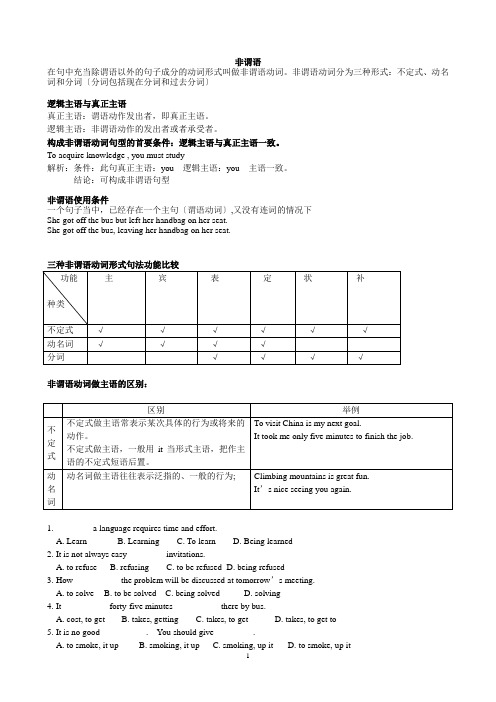
非谓语在句中充当除谓语以外的句子成分的动词形式叫做非谓语动词。
非谓语动词分为三种形式:不定式、动名词和分词〔分词包括现在分词和过去分词〕逻辑主语与真正主语真正主语:谓语动作发出者,即真正主语。
逻辑主语:非谓语动作的发出者或者承受者。
构成非谓语动词句型的首要条件:逻辑主语与真正主语一致。
To acquire knowledge , you must study解析:条件:此句真正主语:you 逻辑主语:you 主语一致。
结论:可构成非谓语句型非谓语使用条件一个句子当中,已经存在一个主句〔谓语动词〕,又没有连词的情况下She got off the bus but left her handbag on her seat.She got off the bus, leaving her handbag on her seat.非谓语动词做主语的区别:1. ________ a language requires time and effort.A. LearnB. LearningC. To learnD. Being learned2. It is not always easy ________ invitations.A. to refuseB. refusingC. to be refusedD. being refused3. How __________ the problem will be discussed at tomorrow’s meeting.A. to solveB. to be solvedC. being solvedD. solving4. It __________ forty-five minutes __________ there by bus.A. cost, to getB. takes, gettingC. takes, to getD. takes, to get to5. It is no good __________. You should give_________.A. to smoke, it upB. smoking, it upC. smoking, up itD. to smoke, up it1. He gave us some advice on how ____ English.A. learningB. learnedC. to learnD. learn2. It ’s a pay day, and they are waiting ____.A. payB. payingC. paidD. to be paid3. I don’t know whether you happen, but I’m going to study in the U.S.A this September . A.to be heard B. to be hearingC.to hear D. to have heard4. I forgot _____ my name when I finished ____ the composition.A. to sign, to writingB. to sign, writingC. signing, writing5. ---You were brave enough to raised objections at the meeting.---Well, now I regret ____ that.A. to doB. to be doingC. to have doneD. having done6. She can’t help ____ the house because she’s busy making a cake.A. to cleanB. cleaningC. cleanedD. being cleaned非谓语动词做表语的区别:1. Her wish is __________ an engineer.A. becomingB. becomeC. to becomeD. being come2.Some people’s greatest pleasure is __________.A. fishingB. to fishC. to be fishingD. being fish3. The report was so _______ that they were all __________.A. inspiring, excitingB. inspiring, excitedC. inspired, excitedD. inspired, exciting4. ---“You look pale.”---“I feel a little __________.”A. tireB. tiredC. tiringD. tiresome非谓语动词做定语的区别:1. She said she had a important meeting ______.A. to attend inB. to attendC. attendD. attending2. He is always the first ______ questions.A. to answerB. answeringC. to be answeredD. being answered3. The Olympic Games _______ in the year 2016 will be a great success.A. being heldB. to be heldC. heldD. to hold4. The first textbooks ____ for teaching English as a foreignlanguage came out in the 16th century.A. having writtenB. to be writtenC. being writtenD. written5. At present, English is the main subject ___________ here.A. to be taughtB. being taughtC. teachingD. to be teaching6. ---"Who are those people with the banner?"---"A group _______ itself the League for peace."A. callingB. callsC. calledD. is called7. The pen __________ belongs to me.A. which it is on the tableB. lying on the tableC. is on the tableD. which on the table1. I have enjoyed my visit here. I'll be very sorry __________.A. for leavingB. of leavingC. to leaveD. left2. I went to see him __________ him out.A. findingB. findC. only to findD. only found3. __________ the cry for help, people immediately rushedout of the rooms.A. To hearB. HearingC. Having heardD. They hearing4. __________ Hello, he reached out his hand.A. SaidB. SayingC. Talked aboutD. Talking to5. _________ from the tallest building, the whole city looks verybeautiful.A. SeeB. SawC. SeeingD. Seen6. ___________ the past, our life is much better.A. Comparing withB. Be compared withC. To compare withD. Compared with非谓语动词做宾语补足语的区别:1. The doctor advised Lao Li __________ more rest.A. that he getB. to getC. would getD. get2. Soon they saw the boy _________ in the crowd.A. disappearB. to disappearC. disappearsD. disappeared3. Birds are seldom heard __________ at night.A. singB. singingC. to singD. to be singing4. He kept me __________ for many hours.A. to waitB. having been waitedC. waitingD. waited5. Mother caught the boy __________ in the corner.A. smokeB. to smokeC. smokingD. being smoked6. Having read the Emperor's New Clothes, we all found it ___.A. interestB. interestedC. interestingD. to interest7. I need this chapter __________ before tomorrow.A. rewritingB. rewrittenC. rewriteD. to write again8. When she returned home, she found the window open andsomething __________.A. to stealB. losingC. missedD. stolen9. There was so much noise that the speaker could not makehimself _________.A. being heardB. heardC. hearingD. hear 非谓语动词的时态和语态:1. around the Water Cube, we were then taken to see the Bird’s Nest for the 2008 Olympic Games.A. Having shownB. To be shownC. Having been shownD. To show2.【2012重庆】______to work overtime that evening, I missed a wonderful film.A. Having been askedB. To askC. Having askedD. To be asked3.【2008福建】___ in the queen for half an hour, the old man suddenly realized be had left the cheque in the car.A. WaitingB. To waitC. Having WaitedD. To have waited4.My son pretended _______ when I came back.A. to sleepB. sleepingC. being sleepingD. to be sleeping5.【2011上海】Today we have chat rooms, text messaging, emailing…, but we seem _____ the art ofcommunicating face-to-face.A. losingB. to be losingC. to be lostD. having lost6.Who is the man ____now?A. operating onB. operated onC. being operated onD. to be operated on7.The question ______ now at the meeting is not the question ______ yesterday.A. discussed; discussedB. discussing; had discussedC. being discussed; discussedD. discussing; discussing8.We asked ___ to work in the countryside.A. to be sentB. to sendC. to be sendingD. sending9._______ a letter, he decided to send a telegram.A. Not receivingB. Receiving notC. Not having receivedD. Having not received10The purpose of new technologies is to make life easier, ______ it more difficult.A. not makeB. not to makeC. not makingD. do not make独立主格结构1〕独立主格结构的逻辑主语与句子的主语不同,它独立存在。
- 1、下载文档前请自行甄别文档内容的完整性,平台不提供额外的编辑、内容补充、找答案等附加服务。
- 2、"仅部分预览"的文档,不可在线预览部分如存在完整性等问题,可反馈申请退款(可完整预览的文档不适用该条件!)。
- 3、如文档侵犯您的权益,请联系客服反馈,我们会尽快为您处理(人工客服工作时间:9:00-18:30)。
非谓语动词三种形式用法的区别:1. 做主语:v-ing & to do 都可以做主语,大多数情况两者没有区别。
注意:但是v-ed不可以做主语。
Exploring the Amazon River deserves courage. ( doing 表抽象的概念)To explore the Amazon River deserves courage. ( to do 表具体的/将来的动作)其余注意事项:1)Seeing is believing.To see is to believe. (即:主语与表语的形式要一致)但是不能说:Seeing is to believe; 或者To see is believing.2)Lincoln said it was not right for the south to break away from the union.Linda said it was nice of you to lend her money.The children’s loving nature can surely inspire their love for their family members.3) It is no good / no use / useless + doing sth 句型It’s no use crying over spilt milk.4) There is no + doing. 句型There is no knowing what will happen next. 谁也不知道下一步会发生什么。
There is no telling what will happen. 谁也无法判断、辨别将要发生什么。
2. 做表语:My favorite hobby is to collect / collecting old coins. (一般概念to do/doing 可以互换)Our aim is to help the old lead a happy life. (表具体的/将来的动作用to do)We were all greatly amazed at the children’s wonderful performance.The children’s wonderful performance was amazing.3. 作宾语:用哪种形式做宾语往往跟动词的搭配用法有关like / love to do & like / love doing;begin / start to do & begin / start doing;prefer to do & prefer doing;continue to do & continue doing;try to do VS try doing;mean to do VS mean doing;can’t help doing VS can’t help (to) dogo on to do VS go on doing;stop to do VS stop doing;forget to do VS forget doing / forget having doneregret to do VS regret doing / regret having done;remember to do VS remember doing / remember having done;sth need doing & sth need to be done (需要)sth require doing & sth require to be done (需要)sth want doing & sth want to be done (需要)sth deserve doing & sth deserve to be done (值得)需要注意的重要形式:特殊疑问词(how / what / when/ where…) + to do = 宾语从句Hearing the sad news, I didn’t know what to do.= Hearing the sad news, I didn’t know what I could do.I couldn’t decide whether to work another year or change my job.= I couldn’t decide whether I could work another year or change my job.2)it 做形式宾语,to do / doing做真正的宾语I though it an honor to have been invited to dinner. ( to be invited to dinner的完成式) I found it no use attempting to lose weight by going on diet.3)I’m looking forward to seeing you again.I have no choice but to stay home for another hour.I have nothing to do but stay home for another hour.I can do nothing but stay home for another hour.4. 作宾语补足语:(考试重点)I often notice a little boy pass this corridor and enter the garden.I found a stranger walking nearby our shop.( doing 强调动作正在进行;(看到、注意到)动作的一部分)( to do强调动作已经完成;(看到、注意到)动作的全过程请注意下列句子的区别:We heard her singing next door. (听到她唱歌动作的一部分;听到她正在唱歌) (主动正在进行)We heard her sing next door. (听到她唱歌动作的全部分;听到她唱过歌) (主动完成)We heard the song sung by her. (听到这首歌被她唱过) (被动完成)We heard the song being sung by her next door. (听到她这首歌正在被她唱)(被动正在进行)Don’t have the water running all the day. (让…一直做) (主动,一直进行)The teacher had him read the text three times. (让...做…)(主动,做具体一件事情)I had my hair colored last Friday. (让…由别人做;遭遇到不好的事情)(被动,有别人完成)注意跟I have a lot of homework to do today. (有) 的区别。
(此句的to do 不做宾补,而是做定语,to do 表示将要完成)需要注意的重要形式:1. After doing lots of experiments, this theory is proved (to be) true.We all consider him (to be) kind and honest.We all believe him (to be) a smart boy.* prove / consider / believe … + sth / sb (宾语)+ (to be) + adj / n2. 逻辑主语Do you mind my opening the window?Do you mind me opening the window? (用me只限于doing做宾语的时候,做doing的逻辑主语)I often hear my neighbors talking and laughing in the garden.I often hear my neighbors’ talking and laughing in the garden.5. 做定语(考试重点)I have three letters to write. (将要自己完成)I have three letters typed. (将有别人完成)Do you know the man sitting under the tree? (主动;正在进行)Have you read any short stories translated by him? (被动;已经完成)The question being discussed at the meeting is of great importance. (被动;正在进行)注意:having done 通常只能做状语/ 宾语,作定语时只能做非限制性定语。
This is the question having been discussed for thousands of years. (×)This is the question discussed for thousands of year. (√)The question, having been discussed for thousands of years, has been solved. (√)与定语从句的转换:The car waiting nearby is a Ford.= The car which is waiting nearby is a Ford.The story, written by a young girl, becomes popular with the teens.= The story, which is written by a young girl, becomes popular with the teens.The parents, looking greatly worried, walked up and down the street.= The parents, who looked greatly worried, walked up and down the street.The question being discussed at the meeting is of great importance.= The question which is being discussed at the meeting is of great importance.6. 做状语(考试重点)1) to do 做状语通常只表目的或结果。
